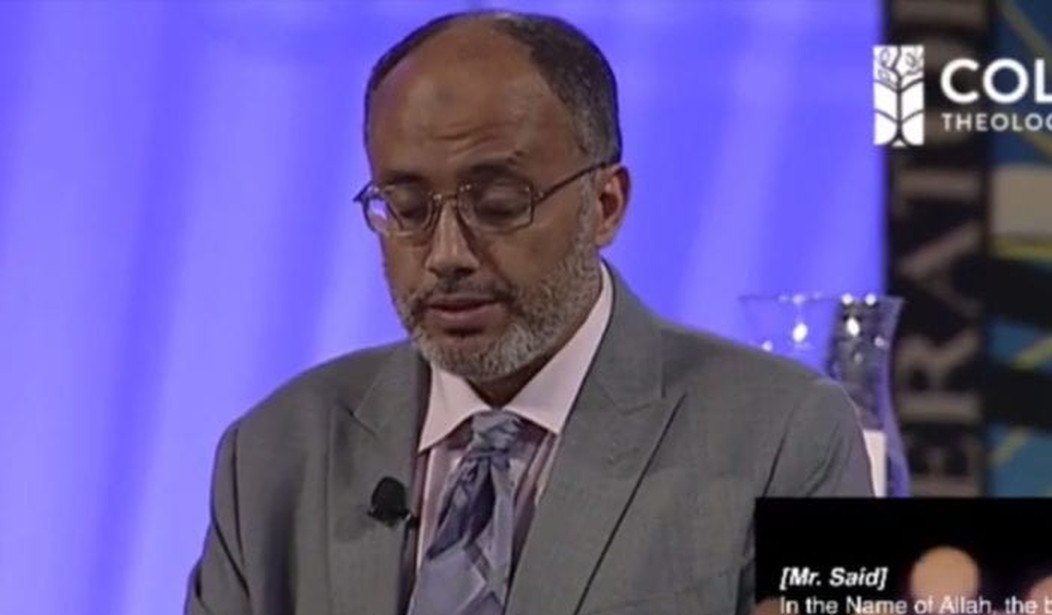The Presbyterian Church (USA) — one of the nation’s foremost mainline Protestant churches and the largest Presbyterian body in the country — recently convened in Portland, Oregon, for its 222nd General Assembly. Its “first order of business” was to commemorate the victims of the Orlando jihad massacre at the Pulse nightclub, as well as those killed last year at the Emanuel African Methodist Episcopal Church in Charleston, South Carolina.
And what better way to do that than to invite a Muslim spokesman to address the assembly?
That’s what the Presbyterians thought, anyway — and predictably enough, hilarity ensued.
Wajdi Said from the Muslim Community Center of Portland, a co-founder of Portland’s Muslim Educational Trust (MET), was the Presbyterians’ choice. The MET, according to its website, is dedicated to helping “create an open, empowering, and collaborative atmosphere within the Muslim community in the greater Portland area,” and is focused upon “education through positive interaction with Muslims and non-Muslims and honest communication with the media and public officials.”
And so, no doubt in the interests of positive interaction with the non-Muslims of the Presbyterian Church USA, Said prayed this at the General Assembly:
Allah bless us and bless our families and bless our Lord. Lead us on the straight path — the path of all the prophets: Abraham, Ishmael, Isaac, Moses, Jesus and Muhammad.
The assembled Presbyterians no doubt thought they were being wonderfully open-minded and ecumenical: a Muslim praying to Allah and invoking Muhammad as a prophet at their General Assembly right after the Orlando jihad massacre! Had there been a more thrilling demonstration of fashionable leftism anywhere since members of the Black Panthers attended upscale dinner parties in the late ’60s?
While the happy Presbyterians were congratulating themselves on their edginess and willingness to stand up to The Man, they didn’t realize that Wajdi Said was not offering a universal prayer of interfaith harmony.
He was actually openly proselytizing for Islam — and denigrating Christianity.
“Lead us on the straight path” is straight from the Fatihah, the Opening. This is the Qur’an’s first chapter, and the most common, oft-repeated prayer in Islam.
The final two verses of the Fatihah ask Allah:
Guide us to the straight path, the path of those upon whom You have bestowed favor, not of those who have evoked anger or of those who are astray.
The traditional Islamic understanding of this prayer: the “straight path” is Islam; the path “of those who have evoked Allah’s anger” are the Jews; those who have gone “astray” are the Christians.
No, this is not a lone “extremist” interpretation.
Most Muslim commentators believe that the Jews are those who have earned Allah’s wrath and that the Christians are those who have gone astray — while the sole “straight path” is Islam.
The classic Qur’anic commentator Ibn Kathir explains:
[T]he two paths He described here are both misguided. … [The] two paths are the paths of the Christians and Jews, a fact that the believer should beware of so that he avoids them.
The path of the believers is knowledge of the truth and abiding by it. In comparison, the Jews abandoned practicing the religion, while the Christians lost the true knowledge.
This is why “anger” descended upon the Jews, while being described as “led astray” is more appropriate of the Christians.
Well, the Presbyterians could still glow in their own politically correct righteousness from Said invoking “Abraham, Ishmael, Isaac, Moses, Jesus, and Muhammad,” correct?
Said sounded as if he were generously acknowledging Judaism, Christianity, and Islam, but in reality he was reflecting the Islamic belief that those figures and the other Biblical prophets all actually taught Islam, but that their messages were corrupted by their followers to create Judaism and Christianity.
The Qur’an (3:67) tells us that Abraham was not a Jew or a Christian, but a Muslim, and so were the other prophets (and Jesus as well) — until their followers hijacked their messages to create the other “Abrahamic faiths.”
Said sounded another superficially ecumenical note:
The creator of the universe, the most merciful, the most compassionate and the Lord of the universe who has created us and made us into nations and tribes, from male and females that we may know each other, not that we might despise each other, or may despise each other.
This, too, was based on the Qur’an:
O mankind, indeed We have created you from male and female and made you peoples and tribes that you may know one another. Indeed, the most noble of you in the sight of Allah is the most righteous of you. Indeed, Allah is Knowing and Acquainted. (49:13)
Said exhorted the Presbyterians:
Incline towards peace and justice and trust in God, for the Lord is one that hears and knows everything and the servants of God, the most compassionate, the most merciful, gracious are those who walk in the earth in humility and when bigots and hateful and Islamophobes address them, they say peace. Peace be upon them and peace be upon Allah.
The Qur’an doesn’t have the bit about “Islamophobes” — although it bristles on nearly every page with venom for those who reject its message — but Said’s statement was based on this:
And the servants of the Most Merciful are those who walk upon the earth easily, and when the ignorant address them, they say peace (Qur’an 25:63).
Wajdi Said was calling on the Presbyterians to forsake the “ignorance” of the “bigots and hateful and Islamophobes,” and to embrace the “straight path,” Islam. The Presbyterians were eagerly receptive to his message, of course, not wanting to appear “Islamophobic.”
This is what “interfaith dialogue” is all about for Islamic supremacists: proselytizing.
But Christian leaders of all denominations, not just the enlightened Presbyterian Church USA, cannot and will not grasp that point, and continue to assume that “dialogue” will bring about the dawn of some new era of mutual understanding, respect, and cooperation.
Meanwhile, back in the real world, far from the smug confines of the Presbyterian Church’s 222nd General Assembly, an enraged 5,000-strong Muslim mob in Egypt, screaming “Egypt is Islamic,” attacked Christians who were trying to build a church in the town of Amria:
One way or another, we’ll bring the church down to the ground. … No church will stand here in the village. It’s either us or you, infidels!
This mob was trying to do the same thing Wajdi Said was doing: guide Christians to the straight path. They were just a bit less subtle about it than he was. But the subtlety will give way as it is no longer needed.
As long as the Presbyterian Church USA and other “dialogue”-besotted Christian bodies continue along the path they’re on, exactly that kind of mob is in their future. And ours.










Join the conversation as a VIP Member